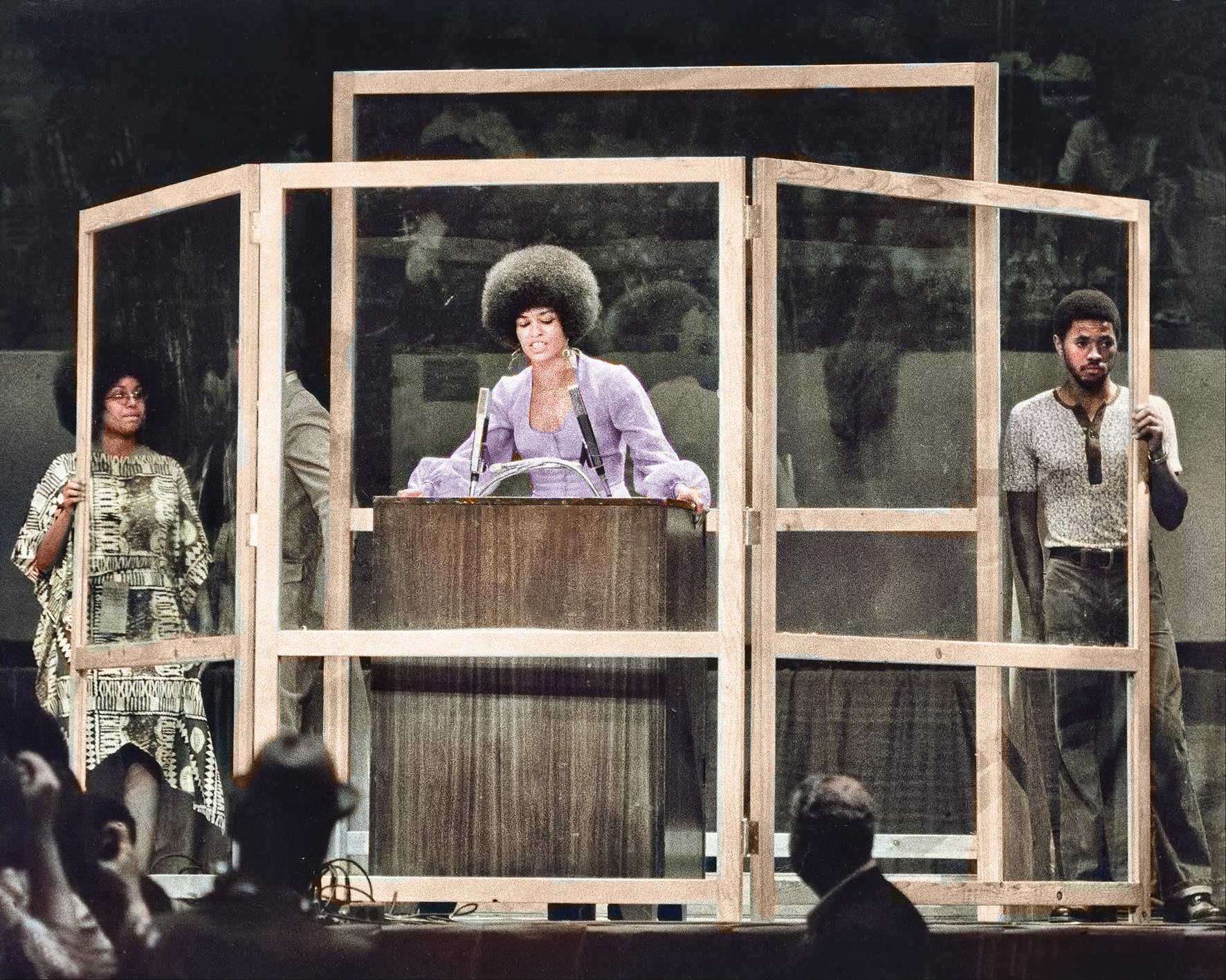
Angela Y. Davis
Distinguished Professor Emerita at UC Santa Cruz
Sruti Basak discusses Davis’ life and work, and gives a multitude of resources to engage with different aspects of her work.
Biography
Angela Y. Davis is an internationally known activist who has worked to combat all forms of oppression in the U.S. and abroad. Over the years she has been active as a student, teacher, writer, scholar, and activist/organizer. Her academic work focusses on Feminism, African American studies, critical theory, popular music culture and social consciousness, and philosophy of punishment (women's jails and prisons). Professor Davis's political activism began at a young age in Birmingham, Alabama, and continued through her high school years in New York where she was involved with both the CPUSA and the Black Panther Party. But it was not until 1969 that she garnered widespread media attention after being removed from her teaching position in the Philosophy Department at UCLA as a result of her membership in the Communist Party, USA. In 1970, she was placed on the FBI's Ten Most Wanted List on false charges and her subsequent sixteen-month incarceration, prompted a massive international "Free Angela Davis" campaign leading to her acquittal in 1972.
Professor Davis's enduring commitment to prisoners' rights dates back to her participation in the campaign to free the Soledad Brothers, which led to her own arrest and imprisonment. She is a founding member of Critical Resistance, a national organization dedicated to the dismantling of the prison industrial complex. She is also associated with Sisters Inside, an abolitionist organization based in Queensland, Australia working in solidarity with women in prison. Having helped to popularize the notion of a “prison industrial complex,” she now urges her audiences to think seriously about the future possibility of a world without prisons and to help forge a 21st century abolitionist movement.
During the last twenty-five years, Professor Davis has lectured in all of the fifty United States, as well as in Africa, Europe, the Caribbean, and the former Soviet Union. Her articles and essays have appeared in numerous journals and anthologies, and she is the author of nine books, including Angela Davis: An Autobiography; Women, Race, and Class; Blues Legacies and Black Feminism: Gertrude "Ma" Rainey, Bessie Smith, and Billie Holiday; The Angela Y. Davis Reader; Are Prisons Obsolete?; a new edition of Narrative of the Life of Frederick Douglass; and The Meaning of Freedom. Today she is Distinguished Professor Emerita in the History of Consciousness and Feminist Studies Departments at the University of California, Santa Cruz. In 1994, she received the distinguished honour of an appointment to the University of California Presidential Chair in African American and Feminist Studies.
Areas of Philosophy: Social & Political Philosophy, Black Feminism, Applied Ethics, Continental Philosophy, Marxist & Socialist Feminism
This biography is summarised from UC Santa Cruz Page. Cover image shows AngelaY. Davis speaking behind a four-sided bulletproof glass shield at Madison Square Garden, 29 June 1972 (image via @redfish on twitter) .
Recommendations for ‘casual engagement’
Angela Davis on Violence and its role in Revolution
Angela Davis on Radical Self Care
Angela Davis on ‘Mainstream Feminism’
13th
She features in Ava DuVernay's documentary on racism and incarceration, '13th', made available to everyone by Netflix on Youtube
Recommended Book: Are Prisons Obsolete?
It is a 51 page book consisting of 6 chapters:
1. Introduction: Prison Reform or Prison Abolition?
2. Slavery, Civil Rights, and Abolitionist Perspectives Toward Prison
3. Imprisonment and Reform
4. How Gender Structures The Prison System
5. The Prison Industrial Complex
6. Abolitionist Alternatives
You can find a free copy here.
Davis clearly articulates, the inducement of moral panics, fear and hate-mongering as integral to the punishment and imprisonment industry. Those benefitting from the continued reliance on imprisonment have the economic and social capital to influence not only those who create public policy and law, but also the public discourse around prisons.
They suggest that unless the practice of imprisoning is continued, civil society will be at risk of the loss of safety, security, and general well-being. Davis goes on to reveal the link between these arguments and the rhetoric and invective that predated the abolition of slavery in the United States. Furthermore, the rise of corporate interests in the development and growth of punishment and imprisonment is a clear and integral part of what she calls ‘The Prison Industrial Complex.’ Davis points out that the impact of the influence of corporatization of this punitive, as opposed to rehabilitative, industry have become embedded, reinforced, and normalised in the individual and collective North American psyche, and increasingly throughout the industrial world, through the recreational and "entertainment" industries, e.g. Prison movies.
Davis argues that it is vital to focus not on reinforcing criminal justice responses that merely promote the status quo, because the status quo marginalises and discriminates against those who are most vulnerable, in a manner that renders them more likely to be criminalised and more likely to be struggling for their very survival. Given the inexorable links between cuts to social services, health programs, and educational opportunities, increased numbers of the poor, she points out that especially young racialised women are more vulnerable to poverty, homelessness, mental and other health challenges, and reduced educational and employment opportunities. She thus lays the foundation for the perspective that these are also the same people who are also more likely to be scapegoated, criminalised, and imprisoned.
